TheIslesofGreecewithnotes
希腊风景作文英文

希腊风景作文英文The Greek landscape is simply breathtaking. Thecrystal-clear waters of the Aegean Sea, the white-washed buildings perched on cliffs, and the golden beaches makefor a stunning view.The sunsets in Greece are like no other. The sky is painted in hues of pink, orange, and purple, creating a mesmerizing display that never fails to leave you in awe.The olive groves in Greece are a sight to behold. The silvery-green leaves shimmer in the sunlight, and the gnarled trunks of the ancient trees tell a story of centuries past.The rugged mountains of Greece are a testament to the country's wild beauty. The sheer cliffs and deep gorges are a paradise for hikers and nature lovers.The ancient ruins scattered across Greece are areminder of the country's rich history. The Acropolis in Athens, the Temple of Apollo in Delphi, and the Palace of Knossos in Crete are just a few examples of the awe-inspiring archaeological sites that Greece has to offer.The charming villages of Greece are a delight to explore. The narrow, cobblestone streets are lined with colorful flowers, and the traditional tavernas offer delicious local cuisine and a warm, welcoming atmosphere.The Greek islands are like something out of a dream.The azure waters, the quaint fishing villages, and the stunning sun-drenched landscapes make for a picture-perfect vacation destination.The natural hot springs in Greece are a true hidden gem. Tucked away in lush greenery or perched on a cliff overlooking the sea, these thermal baths offer a relaxing and rejuvenating experience like no other.The diverse flora and fauna of Greece make it aparadise for nature enthusiasts. From rare orchids andwildflowers to dolphins and sea turtles, the country is teeming with unique and beautiful wildlife.。
《Isles of Greece》赏析

这首《哀希腊》节选自拜伦改写自西班牙传说的Don Juan ,在主人公的婚宴上由⼀一位呤游诗人弹唱。
希腊是欧洲文明的发源地,有过灿烂的历史,十九世纪初却沦亡在土耳其的铁蹄下。
作者通过古今对比,将⼀一腔悲愤付诸笔端,号召希腊人民觉醒争取民族独立。
从背景而言在拜伦出生不久他父亲就遗弃家庭不知所踪,拜伦跟随母亲孤儿寡母在苏格兰过着节衣缩食的清贫生活。
拜伦先天性的跛足,而他的母亲性情乖戾、喜怒无常,这两方面的原因使得他形成了孤僻和忧郁的性格。
所以在拜伦的诗中都透露着⼀一种孤傲、狂热、浪漫,却充满了反抗精神的气质,内心充满了孤独与苦闷,却又蔑视群小。
拜伦诗中最具有代表性、战斗性,也是最辉煌的作品是他的长诗《唐璜》,诗中描绘了西班牙贵族子弟唐璜的游历、恋爱及冒险等浪漫故事,揭露了社会中黑暗、丑恶、虚伪的⼀一面,奏响了为自由、幸福和解放而斗争的战歌。
这篇节选自《唐璜》的《哀希腊》正是其代表之⼀一。
从诗歌修辞而言整首诗歌韵律感极强,结尾处的押韵浑然天成,呈现出ABABCC,DEDEFF的形式,读起来朗朗上口是⼀一;结尾多以清辅音和元音收住,便于吟唱与回转,有种回音空荡之效,这是其二;这首诗讲述的是号召希腊人民觉醒争取民族独立,结尾处的清音与诗句中的重音形成对比,⼀一壮⼀一哀,情感跌宕,悲壮和哀鸣流离往返,便是其三。
文章中还多处用到例如“o’er, ne’er”这样的省音手法,主要是为了便于平仄韵律,是考虑到了整体的效果而为。
从效果而言比如第二节,muse, harp, lute三字⼀一出,虽未见其形,但已闻其声,希腊的文明源远流长,其音乐的造诣自不用多说,但⼀一到mute, 所有感觉犹如巨石堵胸,那或悠扬,或激进,或沉重,或奔放的旋律都硬生生的被堵了回去,叫人无奈,又暗有讽刺,也或是激励。
又如第五节,divine用的很好,与下⼀一句开头的degenerate,形成韵律上叠音,或者说不太严格意义上的押头韵,两字的含义是如此的天差地别,这样的落差,在紧紧的两字之间更显起伏,上到神性光辉,下到奴囚平阶,暗示希腊是不能就此放弃的,这样的命运本就不该希腊承受。
希腊典籍英语作文

希腊典籍英语作文The cradle of Western civilization, Greece, has a richtapestry of literature that has shaped the world's understanding of philosophy, drama, and poetry. Ancient Greek literature is a treasure trove of knowledge, offeringinsights into the lives, thoughts, and values of a societythat laid the foundation for modern Western culture.Homer's Epics: The Iliad and The OdysseyAt the heart of Greek literature are the epic poemsattributed to Homer, "The Iliad" and "The Odyssey." The Iliad, a tale of war and heroism, recounts the events of the Trojan War and the wrath of Achilles, one of the greatest warriorsof his time. The Odyssey, on the other hand, is an epicjourney of the hero Odysseus as he navigates his way back home after the war. These two works are not only greatstories but also profound explorations of human nature, leadership, and the divine.Tragedy and Comedy: The Birth of DramaThe ancient Greeks were the pioneers of theatrical drama,with playwrights like Aeschylus, Sophocles, and Euripides crafting tragedies that explored the human condition through the lens of myth and fate. Aeschylus, known as the "Father of Tragedy," introduced the concept of dialogue into drama with his trilogy "The Oresteia." Sophocles, with plays like"Oedipus Rex," delved into the complexities of the human psyche, while Euripides often questioned traditional valuesin works such as "Medea." On the lighter side, Aristophanes brought humor and satire to the stage with his comedies, providing a critical yet entertaining commentary on Athenian society.Philosophical Dialogues: The Socratic MethodSocrates, Plato, and Aristotle are the cornerstones of Western philosophy, and their works have had a lasting impact on ethics, politics, and metaphysics. Socrates, though he did not write any books himself, is immortalized through the dialogues of his student Plato. These dialogues, such as "The Republic" and "The Symposium," present Socrates' method of questioning to arrive at philosophical truths. Aristotle, a student of Plato, went on to write extensively on a wide range of subjects, from biology to ethics, in works like "Nicomachean Ethics" and "Politics."The Lyric Poets: Voices of EmotionIn addition to the epics and philosophical texts, ancient Greek literature includes the works of lyric poets who expressed personal emotions and experiences. Sappho, knownfor her love poetry, and Pindar, celebrated for his odes to athletic victors, are two such poets whose works have been cherished for their beauty and emotional depth.ConclusionThe legacy of ancient Greek literature is vast and profound, continuing to inspire and educate generations. It is through these works that we can glimpse into the lives of ancient Greeks, their struggles, their triumphs, and their quest for understanding the world around them. The themes and ideas presented in these texts continue to resonate today, proving the timeless nature of Greek literature and its enduring influence on the literary and philosophical landscape of the world.。
专八人文知识英国文学主要作家、作品表

Comedies: The Comedy of Errors 1592; The Taming of the Shrew 1593; The Two Gentlemen of Verona 1594; Love's Labour's Lost 1594
William Langland威廉兰格伦
Piers the Plowman耕者皮尔斯
Geoffrey Chaucer杰佛利•乔叟1340-1400
长诗:The House of Fame声誉之堂;Troilus and Criseyde特罗勒斯与克丽西徳小说:Canterbury Tales坎特伯宙故李集•…英国文学史上现实主义第一部杰作
Oliver Goldsmith哥尔斯密1728-1774
The Vicar of Wakefield威克菲尔徳牧师传;The Citizen of the World世界公民;The Deserted荒村;She Stoops to Conquer屈身求爱
Thomas Gray托马斯•格宙
Elegy Written in a Country Churchyard墓园挽歌
专八人文知识英国文学主要作
-本页仅作为文档封面,使用时请直接删除即可-
-内页可以根据需求调整合适字体及大小-
专八人文知识英国文学主要作家、作品表
英国文学
Part 1. Old and medieval
Beowulf贝尔武甫(the national epic of the English people) Striking feature: alliteratior\ metaphors and understatements.
The Isles of Greece 英汉对照
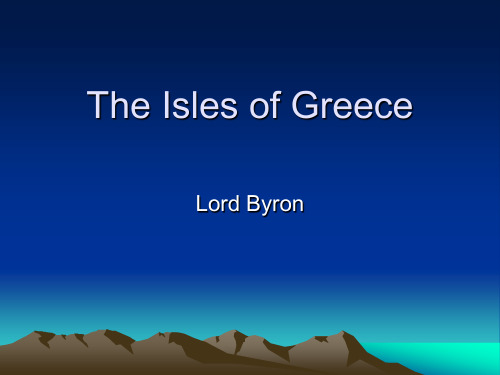
• Must we but weep o'er days more blest? Must we but blush?---Our fathers bled. Earth! render back from out thy breast A remnant of our Spartan dead! Of the three hundred grant but three, To make a new Thermopylae.
• The Scian and the Teian muse, The hero's harp, the lover's lute, Have found the fame your shores refuse; Their place of birth alone is mute To sounds which echo further west Than your sires' "Islands of the Blest."
• You have the Pyrrhic dance as yet, Where is the Pyrrhic phalanx gone? Of two such lessons, why forget The nobler and the manlier one? You have the letters Cadmus gave--Think ye he meant them for a slave?
• • • • •
劝君莫信佛郎克,自由非可他人托。 佛郎克族有一王,狡童心深不可测。 可托惟有希腊军,可托惟有希腊刀。 劝君信此勿复疑,自由托人终徒劳。 吁嗟乎!突厥之暴佛郎狡,希腊分裂苦不早。
• • • • •
the isles of greece鉴赏
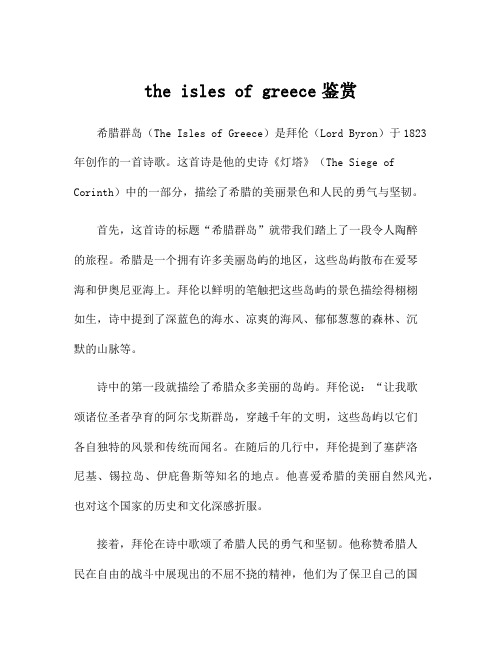
the isles of greece鉴赏希腊群岛(The Isles of Greece)是拜伦(Lord Byron)于1823年创作的一首诗歌。
这首诗是他的史诗《灯塔》(The Siege of Corinth)中的一部分,描绘了希腊的美丽景色和人民的勇气与坚韧。
首先,这首诗的标题“希腊群岛”就带我们踏上了一段令人陶醉的旅程。
希腊是一个拥有许多美丽岛屿的地区,这些岛屿散布在爱琴海和伊奥尼亚海上。
拜伦以鲜明的笔触把这些岛屿的景色描绘得栩栩如生,诗中提到了深蓝色的海水、凉爽的海风、郁郁葱葱的森林、沉默的山脉等。
诗中的第一段就描绘了希腊众多美丽的岛屿。
拜伦说:“让我歌颂诸位圣者孕育的阿尔戈斯群岛,穿越千年的文明,这些岛屿以它们各自独特的风景和传统而闻名。
在随后的几行中,拜伦提到了塞萨洛尼基、锡拉岛、伊庇鲁斯等知名的地点。
他喜爱希腊的美丽自然风光,也对这个国家的历史和文化深感折服。
接着,拜伦在诗中歌颂了希腊人民的勇气和坚韧。
他称赞希腊人民在自由的战斗中展现出的不屈不挠的精神,他们为了保卫自己的国家而勇敢地奋斗。
拜伦以诗人的方式回顾了希腊人民长期以来的苦难与抗争,比如在奥斯曼土耳其统治下的艰难岁月。
拜伦尤其称赞希腊的英雄们,他们为了自由而献出了自己的生命。
拜伦描述说,这些英雄们“将自己的崇高信仰和力量展示给世界”。
这些英雄包括了著名的斯巴达王子列奥尼达斯、雅典诗人索福克勒斯等,他们的勇敢行为激励着希腊人民继续战斗。
此外,拜伦揭示了希腊人民对自由的渴望和对压迫的抵抗。
他表达了他对奥斯曼土耳其统治的愤怒,以及希腊人民追求独立的决心。
他呼吁其他国家和民族支持希腊人民的斗争,希望他们能够获得真正的自由。
最后,这首诗以一种悲壮的情绪结束。
拜伦表达了自己对希腊远景的担忧和对未来的忧虑。
他认为希腊人民的远景是光明的,但也感到他们会经历许多困难和挫折。
这是一个反映拜伦本人希望希腊能够获得自由和繁荣的情感。
总结来说,《希腊群岛》是一首富有感情和意义的诗歌,通过描绘希腊美丽的岛屿风景和勇敢的人民,表达了拜伦对希腊自由斗争的支持和希望。
介绍希腊历史英文作文

介绍希腊历史英文作文英文,As a history enthusiast, I am fascinated by the rich and complex history of Greece. From the ancient civilization of the Minoans to the classical era of Athens and Sparta, Greece has left an indelible mark on Western civilization.The history of Greece can be traced back to the Bronze Age, with the rise of the Minoan civilization on the island of Crete. The Minoans were known for their advanced architecture, art, and trade, and their influence can be seen in later Greek culture.However, it is the classical era of Greece that is perhaps the most well-known and celebrated. This was a time of great achievements in philosophy, literature, and art, with the likes of Socrates, Plato, and Aristotle shaping Western thought and culture for centuries to come. Thecity-states of Athens and Sparta also played a crucial role in this era, with their military prowess and politicalsystems influencing later civilizations.Of course, no discussion of Greece would be complete without mentioning its mythology, which has captured the imaginations of people around the world. From the epic tales of the Trojan War to the adventures of Odysseus, Greek mythology has become a cornerstone of Western literature and culture.中文,作为一个历史爱好者,我对希腊的丰富而复杂的历史深感着迷。
Greece 英文介绍希腊神话、爱琴海
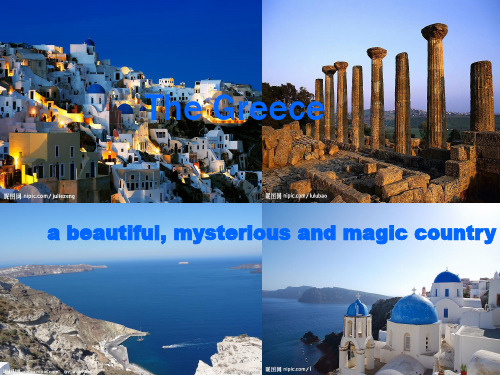
Santorini, you may have a good impression of Greece.you can enjoy sunlight,blue sky ,sunset and white house.
Mykonos(米克诺斯岛)
Mykonos is called “ Closest to paradise ”.It has the most beautiful islands in the world.
cloud gatherer,who holds the terrible thunderbolt. His bird the eagle, his tree is
the oak .
He is married to Hera but,is famous for his many
affairs. He is also known to punish those that lie or break
Apollo(阿波罗):
the god of light.
Artemis(阿尔忒弥斯): the goddess of chastity,virginity,the hunt,
the moon,and the natural environment.
Athena(雅典娜):
the Greek virgin goddess of reason,
Then we talk about the scenery of Greece
Mountains and hills account for eighty percents area of Greece,so this country become one of the most beautiful and mountainous country in the Europe.
有深意的希腊文化英语作文

有深意的希腊文化英语作文Greece, a country rich in history and culture. From ancient mythology to modern traditions, Greek culture is filled with deep meaning and significance. Let's explore some aspects of Greek culture that hold special significance.Greek cuisine, known for its delicious flavors and fresh ingredients, is a true reflection of the country's culture. From moussaka to souvlaki, each dish tells a story of the region it comes from. The use of olive oil, herbs, and spices adds depth to the flavors, creating a unique culinary experience. Greek food is not just about sustenance, it is a celebration of life and a way to bring people together.Greek music, with its distinct melodies and rhythms, has a profound impact on the culture. Whether it's traditional folk music or modern pop songs, Greek music is deeply emotional and often tells stories of love, loss, andtriumph. The use of instruments like the bouzouki and the baglama adds a distinct flavor to the music, making it instantly recognizable.Greek architecture, with its iconic columns and grand structures, is another aspect of the culture that holds deep meaning. From the Parthenon in Athens to the Palace of Knossos in Crete, Greek architecture is a testament to the country's rich history and influence. The precision and symmetry in the design of these structures reflect the Greeks' pursuit of perfection and harmony.Greek language, with its unique alphabet and rich vocabulary, is a key element of the culture. Each word carries a weight and significance, often rooted in ancient mythology and philosophy. The Greek language has givenbirth to many words and concepts that are still used today, such as democracy, philosophy, and tragedy. It is a language that connects the past with the present, bridging the gap between generations.Greek art, with its intricate details and timelessbeauty, is a reflection of the culture's deep appreciation for aesthetics. From pottery to sculpture, Greek art captures the essence of human emotion and the beauty of the natural world. The use of mythology and symbolism adds layers of meaning to the artwork, making it a visual representation of the culture's beliefs and values.In conclusion, Greek culture is a tapestry of deep meaning and significance. From its cuisine to its music, architecture, language, and art, every aspect of Greek culture reflects the country's rich history and traditions. It is a culture that celebrates life, embraces emotions, and cherishes the beauty of the world around us.。
The isles of Greece
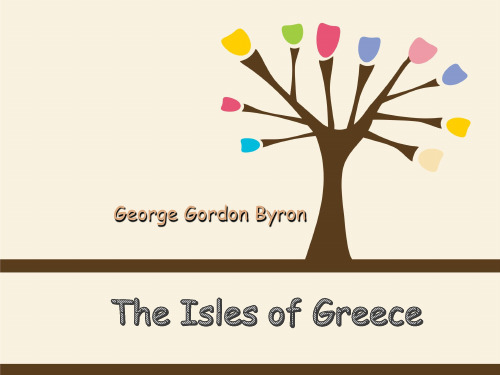
Byron
The
Theme
Calling for freedom and independence calling for revolts against tyranny The author contrast the difference between the ancient and modern, to express the grief and indignation, call for the Greek people‟s awakening to fight for national independence. The poem was interpreted into Chinese in the 12Century, which caused a profound effect . The suffering that Greece experienced is a vivid reflection of China‟s past impotence and indignity at the hands of colonial powers in the modern history.
George Gordon Byron
这首《哀希腊》节选自拜伦改写自西班牙传说的Don Juan ,在主人公的婚宴 上由一位呤游诗人弹唱。希腊是欧洲文明的发源地,有过灿烂的历史,十九 世纪初却沦亡在土耳其的铁蹄下。作者通过古今对比,将一腔悲愤付诸笔端, 号召希腊人民觉醒争取民族独立。
Brief Introduction
But all, except their sun, is set.
可除了日头,一切已沉沦。
*狄洛斯-爱琴海中岛名。
Phoebus:
古希腊英文简介
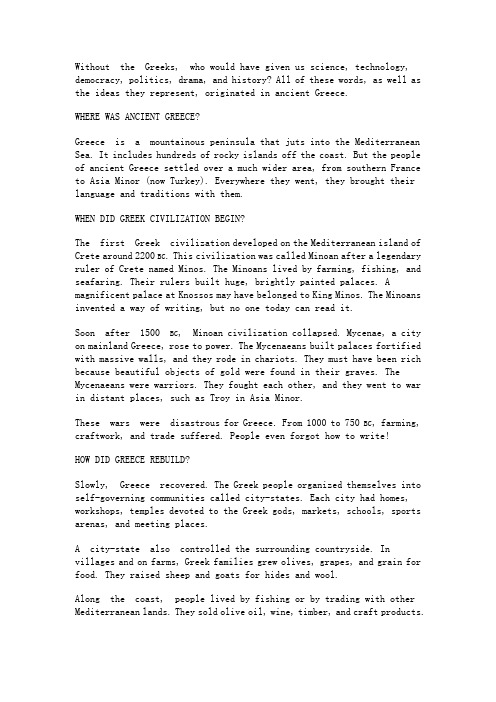
Without the Greeks, who would have given us science, technology, democracy, politics, drama, and history? All of these words, as well as the ideas they represent, originated in ancient Greece.WHERE WAS ANCIENT GREECE?Greece is a mountainous peninsula that juts into the Mediterranean Sea. It includes hundreds of rocky islands off the coast. But the people of ancient Greece settled over a much wider area, from southern France to Asia Minor (now Turkey). Everywhere they went, they brought their language and traditions with them.WHEN DID GREEK CIVILIZATION BEGIN?The first Greek civilization developed on the Mediterranean island of Crete around 2200 BC. This civilization was called Minoan after a legendary ruler of Crete named Minos. The Minoans lived by farming, fishing, and seafaring. Their rulers built huge, brightly painted palaces. A magnificent palace at Knossos may have belonged to King Minos. The Minoans invented a way of writing, but no one today can read it.Soon after 1500 BC, Minoan civilization collapsed. Mycenae, a city on mainland Greece, rose to power. The Mycenaeans built palaces fortified with massive walls, and they rode in chariots. They must have been rich because beautiful objects of gold were found in their graves. The Mycenaeans were warriors. They fought each other, and they went to war in distant places, such as Troy in Asia Minor.These wars were disastrous for Greece. From 1000 to 750 BC, farming, craftwork, and trade suffered. People even forgot how to write!HOW DID GREECE REBUILD?Slowly, Greece recovered. The Greek people organized themselves into self-governing communities called city-states. Each city had homes, workshops, temples devoted to the Greek gods, markets, schools, sports arenas, and meeting places.A city-state also controlled the surrounding countryside. In villages and on farms, Greek families grew olives, grapes, and grain for food. They raised sheep and goats for hides and wool.Along the coast, people lived by fishing or by trading with other Mediterranean lands. They sold olive oil, wine, timber, and craft products.The Greeks were especially known for their excellent metalwork and painted pottery.The Greeks liked debating, questioning, and exploring new ideas. They admired logical arguments and scientific proof. They believed in justice and human dignity. But they were not all equal. Some Greeks were born free. Others were slaves with no rights. Greek men had freedom to work, study, and travel. Women spent their lives at home. They wove cloth, bore children, and cared for their families.The Greeks also believed in gods who controlled human lives. They honored the gods and made offerings to them. In return, they hoped for blessings. To please the gods, city-states held religious festivals, with competitions in music, dance, drama, poetry, and sports. The Olympic Games began as a religious festival of this kind, probably in 776 BC.WHICH WAS THE STRONGEST CITY-STATE?By around 500 BC, two city-states were supreme. Sparta was famous for its fearsome fighting men. It had a powerful ruling council, secret police, and spies. All its citizens—including women and children—were trained to be tough and brave. Slaves grew food.Athens was a democracy. All adult male citizens had the right to elect leaders, serve on juries, and debate government plans. Athenians prized learning and the arts. They asked the best artists, architects, philosophers, and writers to live and work in their city. From 480 to 359 BC, Athens collected tribute(payments) from smaller, weaker Greek cities. It used this money, and wealth from its silver mines, to buy warships. It also rebuilt the center of the city in magnificent style, with temples, statues, law courts, theaters, and strong walls.From 490 to 479 BC, Athens and Sparta fought together against invaders from Persia. But then they became rivals. From 431 to 404 BC, they fought each other in a bitter war. The war severely weakened both powers.HOW DID GREEK POWER END?In 338 BC, Greece was conquered by Macedonia, a kingdom to the north. City-states lost their political power, but Greek civilization continued and spread to many distant lands. Under Macedonian rule, Greek philosophers, mathematicians, and scientists made discoveries that are still useful today.In 146 BC, Roman armies invaded Greece. Roman leaders admired Greek achievements, and so Greek ideas and artistic styles spread still further, through the lands of the Roman Empire. In AD 395, Greece became part of the Byzantine Empire. It was ruled from the city of Constantinople (now Istanbul, Turkey). Greek language, knowledge, and technology remained important until the Byzantine Empire fell to Ottoman Turks in 1453.THE INFLUENCE OF ANCIENT GREECEToday, Greek civilization still shapes the way people think, speak, study, govern, design buildings, and spend their leisure time. Many words in the English language come from Greek roots. Questions raised by Greek philosophers are still debated. Greek plays are read and performed. The Olympic Games are held every four years, just as in ancient Greece. Many of our buildings—especially those with tall, round columns—are modeled after Greek buildings. The influence of ancient Greece is felt throughout Europe and in all the lands that European nations once ruled.。
the isles of greece鉴赏
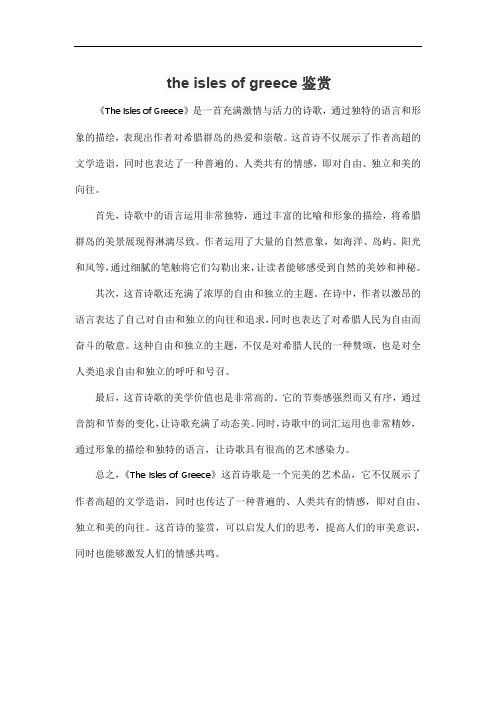
the isles of greece鉴赏
《The Isles of Greece》是一首充满激情与活力的诗歌,通过独特的语言和形象的描绘,表现出作者对希腊群岛的热爱和崇敬。
这首诗不仅展示了作者高超的文学造诣,同时也表达了一种普遍的、人类共有的情感,即对自由、独立和美的向往。
首先,诗歌中的语言运用非常独特,通过丰富的比喻和形象的描绘,将希腊群岛的美景展现得淋漓尽致。
作者运用了大量的自然意象,如海洋、岛屿、阳光和风等,通过细腻的笔触将它们勾勒出来,让读者能够感受到自然的美妙和神秘。
其次,这首诗歌还充满了浓厚的自由和独立的主题。
在诗中,作者以激昂的语言表达了自己对自由和独立的向往和追求,同时也表达了对希腊人民为自由而奋斗的敬意。
这种自由和独立的主题,不仅是对希腊人民的一种赞颂,也是对全人类追求自由和独立的呼吁和号召。
最后,这首诗歌的美学价值也是非常高的。
它的节奏感强烈而又有序,通过音韵和节奏的变化,让诗歌充满了动态美。
同时,诗歌中的词汇运用也非常精妙,通过形象的描绘和独特的语言,让诗歌具有很高的艺术感染力。
总之,《The Isles of Greece》这首诗歌是一个完美的艺术品,它不仅展示了作者高超的文学造诣,同时也传达了一种普遍的、人类共有的情感,即对自由、独立和美的向往。
这首诗的鉴赏,可以启发人们的思考,提高人们的审美意识,同时也能够激发人们的情感共鸣。
The-Isles-of-Greece-with-notes
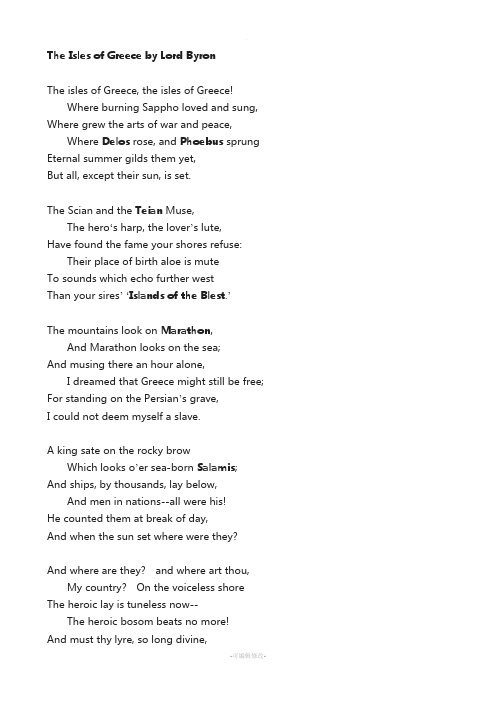
The Isles of Greece by Lord ByronThe isles of Greece, the isles of Greece!Where burning Sappho loved and sung, Where grew the arts of war and peace, Where Delos rose, and Phoebus sprung Eternal summer gilds them yet,But all, except their sun, is set.The Scian and the Teian Muse,The hero‘s harp, the lover’s lute,Have found the fame your shores refuse: Their place of birth aloe is muteTo sounds which echo further westThan your sires’‘Islands of the Blest.’The mountains look on Marathon,And Marathon looks on the sea;And musing there an hour alone,I dreamed that Greece might still be free; For standing on the Persian’s grave,I could not deem myself a slave.A king sate on the rocky browWhich looks o’er sea-born Salamis; And ships, by thousands, lay below,And men in nations--all were his!He counted them at break of day,And when the sun set where were they?And where are they? and where art thou, My country? On the voiceless shore The heroic lay is tuneless now--The heroic bosom beats no more!And must thy lyre, so long divine,Degenerate into hands like mine?‘Tis something, in the dearth of fame, Though linked among a fettered race, To feel at least a patriot’s shame,Even as I sing, suffuse my face;For what is left the poet here?For Greeks a blush--for Greece a tear.Must we but weep o‘er days more blest?Must we but blush?--Our fathers bled. Earth! render back from out thy breastA remnant of our Spartan dead!Of the three hundred grant but three,To make a new Thermopylae!What, silent still? and silent all?Ah! no;--the voices of the dead Sound like a distant torrent‘s fall,And answer, “Let one living head,But one arise,--we come, we come!“‘T is but the living who are dumb.In vain--in vain: strike-other chords:Fill high the cup with Samian wine! Leave battles to the Turkish hordes,And shed the blood of Scio‘s vine! Hark! rising to the ignoble call--How answers each bold bacchanal!You have the Pyrrhic dance as yet;Where is the Pyrrhic phalanx gone? Of two such lessons, why forgetThe nobler and the manlier one? You have the letters Cadmus gave--Think ye he meant them for a slave?Fill high the bowl with Samian wine!We will not think of themes like these! It made Anacreon’s song divine:He served--but served Polycrates--A tyrant; but our masters thenWere still at least our countrymen.The tyrant of the ChersoneseWas freedom’s best and bravest friend; That tyrant was Miltiades!Oh that the present hour would lend Another despot of the kind!Such chains as his were sure to bind.Fill high the bowl with Samian wine!On Suli’s rock, and Parga’s shore, Exists the remnant of a lineSuch as the Doric mothers bore;And there, perhaps, some seed is sown, The Heracleidan blood might own.Trust not for freedom to the Franks;They have a king who buys and sells. In native swords, and native ranksThe only hope of courage dwells,But Turkish force, Latin fraudWould break your shield, however broad.Fill high the bowl with Samian wine!Our virgins dance beneath the shade.I see their glorious black eyes shine,But gazing on each glowing maid,My own the burning tear-drop laves,To think such breasts must suckle slaves.Place me on Sunium‘s marbled steep,Where nothing, save the waves and I,May hear our mutual murmurs sweep;There, swan-like, let me sing and die:A land of slaves shall ne’er be mine--Dash down yon cup of Samian wine!Persian Wars500 B.C.–449 B.C., series of conflicts fought between Greek states and the1 Persian Empire. The writings of Herodotus, who was born c.484 B.C., are the great source of knowledge of the history of the wars. At their beginning the Persian Empire of Darius I included all of W Asia as well as Egypt. On the coast of Asia Minor were a few Greek city-states, and these revolted (c.500) against Darius’ despotic rule. Athens and Eretria in Euboea (now Évvoia)gave the Ionian cities some help but not enough, and they were subdued (494) by the Persians. Darius decided to punish Athens and Eretria and to add Greece to his vast empire. In 492 a Persian expedition commanded by Mardonius conquered Thrace and Macedon, but its fleet was crippled by a storm.A second expedition, commanded by Artaphernes and Datis, destroyed2 (490) Eretria and then proceeded against Athens. The Persians encamped20 mi (32 km) from the city, on the coast plain of Marathon. Here they wereattacked and decisively defeated (Sept.) by the Athenian army of 10,000men aided by 1,000 men from Plataea. The Athenians were heavilyoutnumbered, but fought under Miltiades, whose strategy won the battle.They had sought the help of Sparta, by way of the Athenian courierPheidippides, who covered the distance (c.150 mi; 241 km) from Athens toSparta within two days. The Spartan forces, however, failed to reachMarathon until the day after the battle.The Persians did not continue the war, but Darius at once began3 preparations for a third expedition so powerful that the overwhelming ofGreece would be certain. He died (486) before his preparations werecompleted, but they were continued by Xerxes I, his son and successor. TheAthenians were persuaded by their leader Themistocles to strengthen theirnavy. In 480, Xerxes reached Greece with a tremendous army and navy, andconsiderable support among the Greeks. The route of the Persian landforces lay through the narrow pass of Thermopylae. The pass wasdefended by the Spartan Leonidas; his small army held back the Persiansbut was eventually trapped by a Persian detachment; the Spartancontingent chose to die fighting in the pass rather than flee. The Atheniansput their trust in their navy and made little effort to defend their city, whichwas taken (480) by the Persians.Shortly afterward the Persian fleet was crushed in the straits off the island ofSalamis by a Greek force. The Greek victory was aided by the strategy ofThemistocles. Xerxes returned to Persia but left a military force in Greeceunder his general, Mardonius. The defeat of this army in 479 at Plataea nearThebes (now Thívai) by a Greek army under the Spartan Pausanias (withAristides commanding the Athenians) and a Greek naval victory at Mycaleon the coast of Asia Minor ended all danger from Persian invasions ofEurope. During the remaining period of the Persian Wars the Greeks in theAegean islands and Asia Minor, under Athenian leadership (see DelianLeague) strengthened their position without seeking conquest.1)“The Isles of Greece” (form Don Juan, iii)(A)Main idea“the Isles of Greece’, taken fro Canto iiiof Don Juan, is among Byron’s most effective poetical utterances on national freedom. All the 16 stanzas that constitute the song are supposed to have been sung by a Greek singer at the wedding feast of Don Juanand Haidee on an isle of Greece. In the song, by contrasting the freedom enjoyed by the ancient Greeks with the enslavement of the early 19th century Greeks under Turkish rule, the poet calls on the Greeks to struggle for their national liberation.(B)Comprehension notes(a)This song, included in the third canto of Byron’s Don Juan, is different from the rest of the poem metrically , consisting of sixteen six-lined stanzas of iambic tetrameter , with a rhyme scheme of ababcc.(b)‘But all, except their sun, is set”: But all their past glories are no more, only the sun still shines upon them.(c)“The Scian and the Teian muse”: referring to Homer and Anacreon. “Muse” here means poet. “Scian ‘-of Scio or Chios in the Grecian Archipolage, claimed to have been the birthplace of Homer. ‘Teian”- of Teos in ancient Ionis, where the poet Anaceron was born.(d)“Have found the fame your shores refuse “: have elsewhere received the honor which Greece itself failed to give.(e)“And, when the sun set, where were they?” Here it refers to the destruction of all the Persian ships at the naval battle of Salamis.(f)“For what is left a poet here?”: What is left for a poet to do here?(g)“Strike other chords“ means to play some other musical composition: here it implies to “deal with other themes”.(h)“Trust not for freedom to the Freedom to the Franks-/They have a king who buys and sells”: Do not depend on foreign countries to obtain freedom for you (i.e. the Greeks), they have a king who buys and sells the interests of others for his own profit(“the Frank” normally refers to France, but here obviously refers to western European countries in general).Canto III, 'The Isles of Greece' 2: Than your sires' "Islands of the Blest."The [blessed isles] of the Greek poets were supposed to have been the Cape de Verd islands or the Canaries.Canto III, 'The Isles of Greece' 4: And when the sun set where were they?Deep were the groans of Xerxes, when he sawThis havoc; for his seat, a lofty moundCommanding the wide sea, o'erlook'd the hosts.With rueful cries he rent his royal robes,And through his troops embattled on the shoreGave signal of retreat; then started wildAnd fled disorder'd. -- Æschylus.Canto III, 'The Isles of Greece' 16: There swan-like, let me sing and die.Soph. Ajax, v. 1217.。
TheStoriesoftheSahara

The Stories of the Sahara (Chinese: 《撒哈拉的故事》) is a semi- autobiographical account of the life of Sanmao (Chinese: 三毛) while she was in the Sahara Desert. It was published in 1976, although some of the earlier stories were published in Taiwan's United Daily News as early as 1974. In the work, she describes her encounters with autochthonous culture s, her adventures, and her relationship with her husband. The Stories of the Sahara is San Mao's first published collection of stories. It was met with immediate success and remains extremely popular in both Mainland China and Taiwan. In a study on the wave of enthusiasm for Taiwanese music and literature that swept the mainland in the 1980s, Hongwei Lu notes that "San Mao’s travel accounts of foreign cultures and life experiences gathered through her living and studying abroad provided post-Mao China with a taste of multiculturalism, and suggested the possibility of not only an expanded consciousness of the world, but a transformation of the way people think about the world and the possibility of being part of it."Sanmao was born in Chongqing (重庆), China, and the whole family moved to Taiwan later. She is said to have read the Dream of the Red Chamber (simplified Chinese: 红楼梦; traditional Chinese: 紅樓夢), a famous Chinese classic, at the age of five and a half years. In elementary school, she read a great deal of literature. Throughout her education she had conflicts with her teachers, including an incident in which she said she wanted to be a garbage collector when she grew up, which her teacher said was unacceptable. During her second year of high school, she shut herself up due to a traumatic incident, and refused to go to school. Her father bought many books for her to read at home, and allowed her to take piano lessons and practice painting.From 1965 to 1969, she studied philosophy in Taiwan, and it was during this period that she experienced her first love. Things didn't work out, so she planned to go as far away as possible, and ended up in Spain.Between 1967 and 1970 she studied in Spain, and then in Germany, and later found work in a law library in the state of Illinois in the US. Eventually, she returned to Taiwan and began working as a German teacher. Her fiance, a 45-year-old German man, died of a heart attack, and she again left Taiwan and returned to Spain.In 1974 she went to the Colonial Spanish Sahara desert (in what is now Western Sahara) and married a Spanish man named Jose Maria Quero Y Ruiz (荷西), whom she met in Madrid seven years before when she was a student. She writes that when she first met Jose in Spain she thought he was veryhandsome, but too young for her. Jose had been waiting for her since she had returned to Taiwan, although they had not been dating at the time.In 1976 she published her first work, the fictionalized-autobiographical The Stories of the Sahara(《撒哈拉的故事》). With its immense success, her early writings were collected in a second book, published under the title Gone With the Rainy Season(《雨季不再来》). Her writings continued to be published from that point on, and her experiences in the Sahara and the Canary Islands were published in several more books.In 1979 her husband drowned while diving. In 1980 she returned to Taiwan, and in November of the same year, she traveled to Central and South America, on commission from Taiwanese publishers. These experiences were recorded in subsequent writings. From 1981 to 1984, she taught and lectured at a university in Taiwan. After this point, she decided to dedicate herself fully to writing.Sanmao's books deal mainly with her own experiences studying and living abroad. They were extremely well received not only in Taiwan but also in mainland China,[1] and they remain popular reads today. From 1976 to the time of her death in 1991, Sanmao published more than 20 books. She also translated the comic Mafalda from Spanish to Chinese.[edit] DeathIn 1991, at the age of 48, Sanmao died in a hospital in Taipei, having hanged herself with a pair of silk stockings. This took place days after a cancer scare and losing the Hong Kong movie award for her script to the film Red Dust (滚滚红尘), a loss which she took poorly. Some fans, most notably Zhang Jingran, claimed her death was a murder. Her apparent suicide came as a shock to many of her readers and was accompanied by public expressions of grief throughout the Chinese-speaking world.真正的快乐,不是狂喜,亦不是苦痛,在我很主观的来说,它是细水长流,碧海无波,在芸芸众生里做一个普通的人,享受生命一刹间的喜悦,那么我们即使不死,也在天堂里了。
- 1、下载文档前请自行甄别文档内容的完整性,平台不提供额外的编辑、内容补充、找答案等附加服务。
- 2、"仅部分预览"的文档,不可在线预览部分如存在完整性等问题,可反馈申请退款(可完整预览的文档不适用该条件!)。
- 3、如文档侵犯您的权益,请联系客服反馈,我们会尽快为您处理(人工客服工作时间:9:00-18:30)。
The Isles of Greece by Lord ByronThe isles of Greece, the isles of Greece!Where burning Sappho loved and sung, Where grew the arts of war and peace,Where Delos rose, and Phoebus sprung Eternal summer gilds them yet,But all, except their sun, is set.The Scian and the Teian Muse,The hero‘s harp, the lover’s lute,Have found the fame your shores refuse: Their place of birth aloe is muteTo sounds which echo further westThan your sires’ ‘Islands of the Blest.’The mountains look on Marathon,And Marathon looks on the sea;And musing there an hour alone,I dreamed that Greece might still be free; For standing on the Persian’s grave,I could not deem myself a slave.A king sate on the rocky browWhich looks o’er sea-born Salamis; And ships, by thousands, lay below,And men in nations--all were his!He counted them at break of day,And when the sun set where were they?And where are they? and where art thou, My country? On the voiceless shore The heroic lay is tuneless now--The heroic bosom beats no more!And must thy lyre, so long divine, Degenerate into hands like mine?‘Tis something, in the dearth of fame,Though linked among a fettered race, To feel at least a patriot’s shame,Even as I sing, suffuse my face;For what is left the poet here?For Greeks a blush--for Greece a tear.Must we but weep o‘er days more blest?Must we but blush?--Our fathers bled. Earth! render back from out thy breastA remnant of our Spartan dead!Of the three hundred grant but three,To make a new Thermopylae!What, silent still? and silent all?Ah! no;--the voices of the dead Sound like a distant torrent‘s fall,And answer, “Let one living head,But one arise,--we come, we come!“‘T is but the living who are dumb.In vain--in vain: strike-other chords:Fill high the cup with Samian wine! Leave battles to the Turkish hordes,And shed the blood of Scio‘s vine! Hark! rising to the ignoble call--How answers each bold bacchanal!You have the Pyrrhic dance as yet;Where is the Pyrrhic phalanx gone? Of two such lessons, why forgetThe nobler and the manlier one?You have the letters Cadmus gave-- Think ye he meant them for a slave?Fill high the bowl with Samian wine!We will not think of themes like these! It made Anacreon’s song divine:He served--but served Polycrates--A tyrant; but our masters thenWere still at least our countrymen.The tyrant of the ChersoneseWas freedom’s best and bravest friend; That tyrant was Miltiades!Oh that the present hour would lend Another despot of the kind!Such chains as his were sure to bind.Fill high the bowl with Samian wine!On Suli’s rock, and Parga’s shore, Exists the remnant of a lineSuch as the Doric mothers bore;And there, perhaps, some seed is sown, The Heracleidan blood might own.Trust not for freedom to the Franks;They have a king who buys and sells. In native swords, and native ranksThe only hope of courage dwells,But Turkish force, Latin fraudWould break your shield, however broad. Fill high the bowl with Samian wine!Our virgins dance beneath the shade.I see their glorious black eyes shine,But gazing on each glowing maid,My own the burning tear-drop laves,To think such breasts must suckle slaves.Place me on Sunium‘s marbled steep,Where nothing, save the waves and I,May hear our mutual murmurs sweep;There, swan-like, let me sing and die:A land of slaves shall ne’er be mine--Dash down yon cup of Samian wine!Persian Wars1 500 B.C.–449 B.C., series of conflicts fought between Greek states and the Persian Empire.The writings of Herodotus, who was born c.484 B.C., are the great source of knowledge of the history of the wars. At their beginning the Persian Empire of Darius I included all of W Asia as well as Egypt. On the coast of Asia Minor were a few Greek city-states, and these revolted (c.500) against Darius’ despotic rule. Athens and Eretria in Euboea (now Évvoia) gave the Ionian cities some help but not enough, and they were subdued (494) by the Persians. Darius decided to punish Athens and Eretria and to add Greece to his vast empire. In 492 a Persian expedition commanded by Mardonius conquered Thrace andMacedon, but its fleet was crippled by a storm.2A second expedition, commanded by Artaphernes and Datis, destroyed (490) Eretria andthen proceeded against Athens. The Persians encamped 20 mi (32 km) from the city, on the coast plain of Marathon. Here they were attacked and decisively defeated (Sept.) by the Athenian army of 10,000 men aided by 1,000 men from Plataea. The Athenians were heavily outnumbered, but fought under Miltiades, whose strategy won the battle. They had sought the help of Sparta, by way of the Athenian courier Pheidippides, who covered the distance (c.150 mi; 241 km) from Athens to Sparta within two days. The Spartanforces, however, failed to reach Marathon until the day after the battle.3 The Persians did not continue the war, but Darius at once began preparations for a third expedition so powerful that the overwhelming of Greece would be certain. He died (486) before his preparations were completed, but they were continued by Xerxes I, his son and successor. The Athenians were persuaded by their leader Themistocles to strengthen their navy. In 480, Xerxes reached Greece with a tremendous army and navy, and considerable support among the Greeks. The route of the Persian land forces lay through the narrow pass of Thermopylae. The pass was defended by the Spartan Leonidas; his small army held back the Persians but was eventually trapped by a Persian detachment; the Spartan contingent chose to die fighting in the pass rather than flee. The Athenians put their trust in their navy and made little effort to defend their city, which was taken (480) by thePersians.Shortly afterward the Persian fleet was crushed in the straits off the island of Salamis bya Greek force. The Greek victory was aided by the strategy of Themistocles. Xerxesreturned to Persia but left a military force in Greece under his general, Mardonius. The defeat of this army in 479 at Plataea near Thebes (now Thívai) by a Greek army under the Spartan Pausanias (with Aristides commanding the Athenians) and a Greek naval victory at Mycale on the coast of Asia Minor ended all danger from Persian invasions of Europe.During the remaining period of the Persian Wars the Greeks in the Aegean islands andAsia Minor, under Athenian leadership (see Delian League) strengthened their positionwithout seeking conquest.1)“The Isles of Greece” (form Don Juan, iii)(A)Main idea“the Isles of Greece’, taken fro Canto iiiof Don Juan, is among Byron’s most effective poetical utterances on national freedom. All the 16 stanzas that constitute the song are supposed to have been sung by a Greek singer at the wedding feast of Don Juan and Haidee on an isle of Greece. In the song, by contrasting the freedom enjoyed by the ancient Greeks with the enslavement of the early 19th century Greeks under Turkish rule, the poet calls on the Greeks to struggle for their national liberation.(B)Comprehension notes(a)This song, included in the third canto of Byron’s Don Juan, is different from the rest of the poem metrically , consisting of sixteen six-lined stanzas of iambic tetrameter , with a rhyme scheme of ababcc.(b)‘But all, except their sun, is set”: But all their past glories are no more, only the sun still shines upon them.(c)“The Scian and the Teian muse”: referring to Homer and Anacreon. “Muse” here means poet. “Scian ‘-of Scio or Chios in the Grecian Archipolage, claimed to have been the birthplace of Homer. ‘Teian”- of Teos in ancient Ionis, where the poet Anaceron was born.(d)“Have found the fame your shores refuse “: have elsewhere received the honor which Greece itself failed to give.(e)“And, when the sun set, where were they?” Here it refers to the destruction of all the Persian ships at the naval battle of Salamis.(f)“For what is left a poet here?”: What is left for a poet to do here?(g)“Strike other chords“ means to play some other musical composition: here it implies to “deal with other themes”.(h)“Trust not for freedom to the Freedom to the Franks-/They have a king who buys and sells”: Do not depend on foreign countries to obtain freedom for you (i.e. the Greeks), they have a king who buys and sells the interests of others for his own profit (“the Frank” normally refers to France, but here obviously refers to western European countries in general).Canto III, 'The Isles of Greece' 2: Than your sires' "Islands of the Blest."The [blessed isles] of the Greek poets were supposed to have been the Cape de Verd islands or the Canaries.Canto III, 'The Isles of Greece' 4: And when the sun set where were they?Deep were the groans of Xerxes, when he sawThis havoc; for his seat, a lofty moundCommanding the wide sea, o'erlook'd the hosts.With rueful cries he rent his royal robes,And through his troops embattled on the shoreGave signal of retreat; then started wildAnd fled disorder'd. -- Æschylus.Canto III, 'The Isles of Greece' 16: There swan-like, let me sing and die.Soph. Ajax, v. 1217.。
